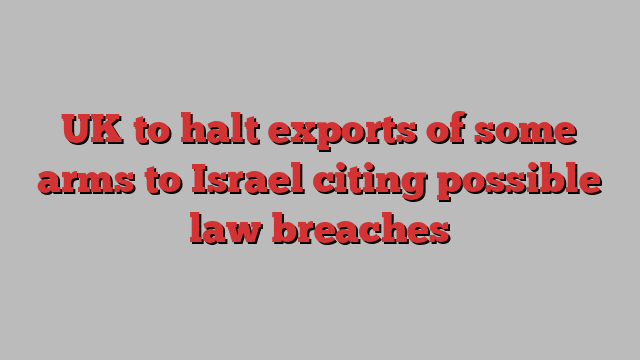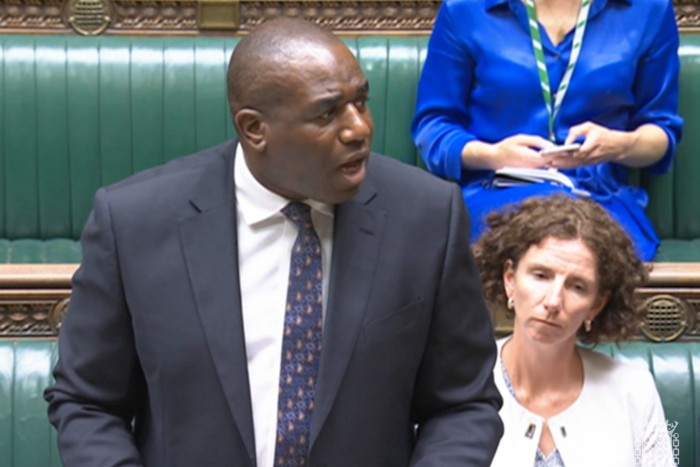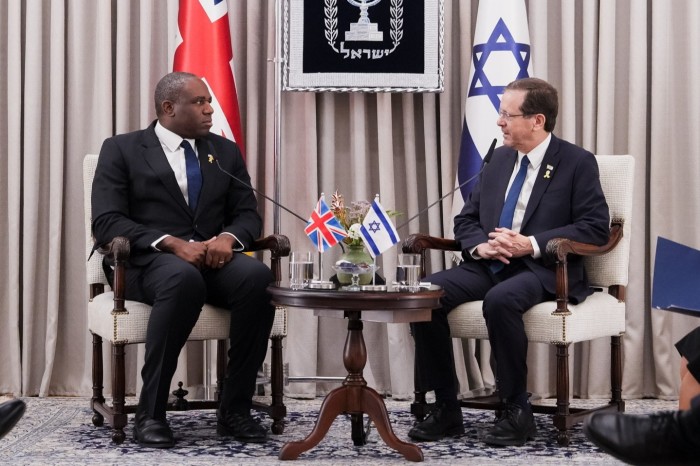
Unlock the Editor’s Digest for free
Roula Khalaf, Editor of the FT, selects her favourite stories in this weekly newsletter.
The UK has announced it will suspend some export licences to Israel for arms used in military operations in Gaza, after a British government review found possible breaches of international humanitarian law by Israel.
David Lammy, UK foreign secretary, told the House of Commons on Monday that the British government was immediately blocking about 30 licences for a range of items including components in military aircraft.
Lammy said he had concluded “with regret” that there was a clear risk of some items exported to Israel being used in serious violations of international humanitarian law.
The decision marks a significant escalation in the pressure being placed on Israel by its western allies over Israel’s war against Hamas in Gaza.
Although the UK is not a major exporter of arms to Israel compared with the US or Germany, with British arms accounting for only about 1 per cent of Israeli imports, the decision will deal a significant diplomatic blow.

“The assessment I have received leaves me unable to conclude anything other than that, for certain UK arms exports to Israel, there does exist a clear risk that they might be used to commit, or facilitate, a serious violation of international humanitarian law,” Lammy told MPs.
Britain is the first major western ally of Israel to partially suspend arms sales to the country since the start of its war against Hamas in Gaza.
The US paused the delivery of one shipment of high-payload munitions in May amid concerns over Israel’s offensive on the southern Gazan city of Rafah, where more than 1mn displaced Palestinians had sought sanctuary.
The UK’s export criteria prevent licences from being issued if the items in question may be used to commit or facilitate serious violations of international humanitarian law.
The move will not affect components for the multinational F-35 joint striker fighter programme, except regarding parts sent directly to Israel.
UK officials determined that suspending critical components within a global pool of spare parts could harm the maintenance and operations of F-35s in other nations.
Licences for equipment used in trainer aircraft and naval equipment that is not being used in Gaza are unaffected, alongside licences for chemicals and telecommunications kit.
There are about 350 UK arms export licences to Israel currently granted. Britain’s suspension of around 30 of these licences will be kept under review, while any new licence applications will be assessed on a case-by-case basis.

The suspension covers licences for equipment that the UK assesses is for use by Israel in the conflict in Gaza, including components of military aircraft such as fighter aircraft, helicopters and drones. It also includes items that facilitate ground targeting.
The government’s move did not change the UK’s robust support for Israel’s security, Lammy stressed.
“The UK continues to support Israel’s right to self-defence in accordance with international law,” he said.
The decision by the Labour government signals the latest shift in UK policy towards Israel and the 10-month war in Gaza since the party defeated the Conservatives in the general election in July.
Since taking office, Prime Minister Sir Keir Starmer has resumed funding to UNRWA, the UN agency for Palestinian refugees, and dropped a proposed challenge to a request by the International Criminal Court’s prosecutor to issue arrest warrants for Israeli Prime Minister Benjamin Netanyahu, his defence minister Yoav Gallant and leaders of Hamas.
The British government assessment examined compliance in three areas: humanitarian provision and access; treatment of Palestinian detainees; and the conduct of the military campaign.
The assessment judged there had been possible breaches of international humanitarian law by Israel in the first two categories, while finding a lack of sufficient verifiable evidence regarding the third.
British ministers have repeatedly called for Israel to bolster humanitarian access to Gaza and improve access to detainees amid allegations of abuse of Palestinian prisoners at the Sde Teiman jail.
The Israel-Hamas war was triggered by Hamas’s October 7 attack that killed 1,200 people and led to another 250 being taken hostage, according to Israeli officials.
Israel’s retaliatory offensive in Gaza has killed more than 40,000 people, according to Palestinian officials, and led to UN warnings about the risk of famine and widespread disease in the besieged strip.
Lammy demanded a comprehensive review of Israel’s compliance with international humanitarian law when he arrived in office around two months ago.
He was not permitted to see the legal advice provided to his predecessor, Lord David Cameron, which was kept confidential under legal privilege.
Lammy has travelled to Israel twice since being appointed foreign secretary.